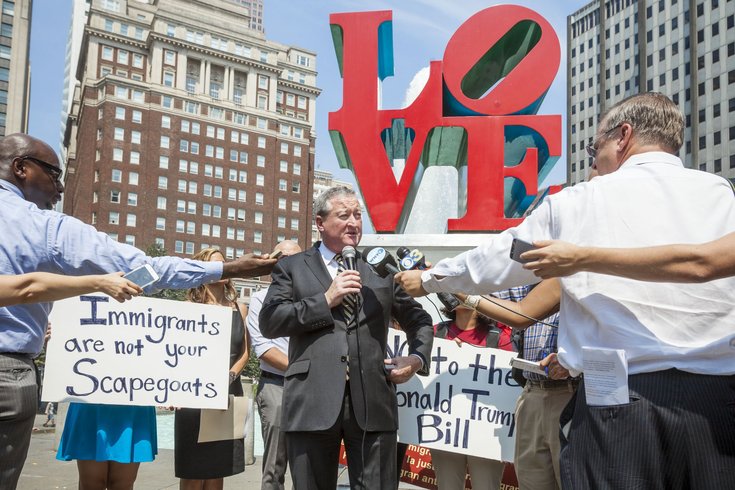
October 12, 2017
 Thom Carroll/PhillyVoice
Thom Carroll/PhillyVoice
Jim Kenney advocates for "sanctuary city" policies during a rally at LOVE Park in July 2015.
At least two Philadelphia policies aimed at protecting undocumented immigrants violate federal law, according to a preliminary assessment conducted by the U.S. Department of Justice.
The policies violate a federal immigration statute that prohibits municipalities from restricting communications between government agencies and federal immigration authorities who seek the immigration status of an individual, according to the DOJ.
Acting Assistant Attorney General Alan Hanson notified Mayor Jim Kenney that Philly stands in violation. In a letter dated Wednesday, Hanson noted that the city's 2016 Edward Byrne Justice Assistance Grant – commonly known as JAG funding – required Philly to comply with the statute.
The Trump administration has taken a hard stance against so-called "sanctuary cities" like Philadelphia, claiming they leave violent criminals on the streets. The assessment is its latest effort to force "sanctuary cities" to comply with federal immigration orders.
Proponents of "sanctuary cities," like Kenney, say they create trust between police and immigrants, who otherwise might be afraid to report crimes.
Kenney disputed the conclusions of the preliminary assessment, saying the city's policies comply with federal law.
"In my view, the DOJ's actions have all been about political showmanship – they have nothing to do with the grant money to which the city is entitled," Kenney said Thursday in a statement. "They also have nothing to do with keeping our communities safe. Philadelphia is at a 40-year low in crime – in no small part because of the hard-won trust our current policies have helped build between police and immigrant communities.
"If victims and witnesses do not feel safe cooperating with the police, every Philadelphian will be less safe."
The DOJ assessment found an executive order signed by Kenney on his inauguration day and a 16-year-old police memorandum signed by former Police Commissioner John Timoney violate the federal statute.
An additional three policies also may not be in compliance, depending on the way Philadelphia applies them.
The Justice Department also found Chicago, New Orleans, New York City and Cook County, Illinois, to be in violation. It determined Milwaukee County, Wisconsin, and Connecticut to be in compliance.
“Jurisdictions that adopt so-called ‘sanctuary policies’ also adopt the view that the protection of criminal aliens is more important than the protection of law-abiding citizens and of the rule of law,” Attorney General Jeff Sessions said in a statement. “... We urge jurisdictions to not only comply with Section 1373 but to establish sensible and effective partnerships to properly process criminal aliens.”
The executive order, signed by Kenney on Jan. 4, 2016, directs Philadelphia police to disregard detainer requests unless they are supported by a judicial warrant and involve a person being released after conviction for a first- or second-degree violent felony.
The police memo, dated May 17, 2001, is designed to encourage immigrants to utilize city services without fear of reprisal. It states that Philly police will cooperate with federal authorities as they investigate immigrants suspected of criminal activities but will not transmit the immigration status of any victims of crimes.
The Justice Department determined that these policies violate federal immigration law because they restrict the sharing of information regarding immigration status, Hanson noted in his letter.
That statute – 8. U.S.C. 1373 – states that a federal, state or local government entity cannot restrict any government entity from "sending to, or receiving from, the Immigration and Naturalization Service information regarding the citizenship or immigration status, lawful or unlawful, of any individual.
Kenney has been an ardent supporter of Philadelphia's "sanctuary city" policies. In August, he announced a lawsuit against Sessions, alleging that new JAG funding requirements that force cities to abandon "sanctuary city" policies are unlawful.
His administration reiterated those claims on Thursday, alleging Sessions overstepped his authority by requiring cities to comply with the statute to receive JAG funding, a grant program that does not directly involve immigration enforcement.
"With respect to the letter the DOJ sent today, just because the DOJ raises these issues does not mean it is correct in what it says," City Solicitor Sozi Pedro Tulante said in a statement. "DOJ is simply wrong in its preliminary review. But these narrow issues are only part of a broader dispute regarding DOJ's authority to impose these conditions on Byrne JAG grants at all."
The Kenney administration has until Oct. 27 to submit a response to the DOJ assessment before a final determination is made, Hanson wrote.